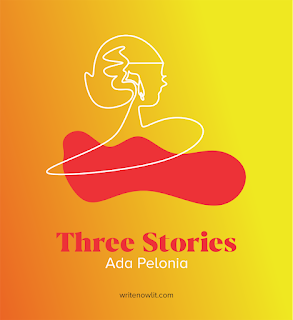Three stories by Ada Pelonia
Butterflies in
My Stomach
Ari had her first bite when her mother told her she
didn’t need a party to celebrate her birthdays because she had no friends, to
begin with. I don’t want to hurt you by
expecting, she said. Had her second bite when being an honor student was no
longer a goal but a job. Had her third when she came out as bisexual and got
slapped twice, stumbling on the shelf where her medals and trophies were
displayed, glimmering in plain sight. Fourth and fifth when she lost her
part-time job in the convenience store and got her scholarship grant rescinded.
Her sixth when she realized her inbox was empty. Seventh when her cat died. Had
her eighth, twelfth, fifteenth in the park while holding the crumpled notice to
vacate letter on her hand as she searched for them hiding in the foliage and
ate every time she found one, hoping she’d feel something, anything. But
there’s nothing. Nothing at all.
*
En Dash
If you want to know who I am,
the answer is ashes and burnt embers.
I want that written in italic on my epitaph, because
bold would look harsh on clear graphite. But first, Sarasate’s Navarra Op.
33 should be blasting on speakers flanked on my casket during my wake, just
because I got a sense of peace after I first heard it played by my favorite
violinists--something I didn’t even know was possible. If only peace could be
bought, I’d hoard and stack it up in the box underneath my bed--a sight for
sore eyes, and not the stash of Prozac I’ve always had for breakfast.
Many say it's an obsession with death I have. I nod,
agreeing, but shake my head seconds after, not sure if they’re right. I’m quite
unsure about everything other than exactly laying out plans on how I want
things to end or how everything should be even after my end.
They could listen to my favorite piece, read my works,
or look at the quotation I have on my epitaph or the epitaph itself, and
appreciate that en dash, the only thing I’ve left behind.
Note:
Referenced quote is by Bart Ehrman from "Heaven and Hell: A History of the Afterlife".
*
Mold
“Anton, do
you know the bearing of your lack of focus? A failure to bag the first place,
that is. Do you want to see your father disappointed?” My eyes dropped on the
carpeted floor, but she held my left cheek and made me look at her.
“Of
course you wouldn’t, right? So we better make sure you’d follow his footsteps.”
She held my shoulders and pressed it down, said this should remove the stiffness, said it’d release the pressure. But my chest only got heavier the second
she took her hands away.
“Do
it again, now with more ease. Show some emotion, balance the rhythm.” She moved
her hands in small circular motion while looking at me straight in the eyes.
I
bit my lower lip and held the end of my violin in the crook of my neck. With my
right being my dominant hand, I had troubles during the pizzicato. My fingers
shook harder than my vibrato, but I managed to finish with ease. Or so I
thought. What could escape my mother’s ears?
“Anton,
how many times have we practiced this? A million times. How could you still not
perfect it!”
“Ma,
I’m tired,” I mumbled under my breath, but she only stared at me.
“Practice,
Anton. Picture the gold, the round of applause, and the smiles of your father.”
She brushed my hair, but her fingers got snagged in the knots of its strands.
She held out the hand she used to touch my hair and wiped it on her skirt. As
her skirt inched upwards, I saw yam-colored patches on her knees.
“Are
you okay, Ma?”
She
only held my chin as she said the words, “do this for your father.” Tears
escaped my eyes when she went out of the room, and I heard the click of the
doorknob barring me from the outside. How long has it even been?
I
laid my violin in its case and greeted the gloom of the room with another sigh.
With the faint light from the lamp, I dropped on my knees and took the sandwich
under the couch from where I’d hide my food whenever it’s time to be here,
which came quite often given that Menuhin is just around the corner.
There
were pewter gray blotches on the bread, but I couldn’t care less. I took a
bite, hoping its mold would coalesce with mine.
__
Ada Pelonia is a writer from
the Philippines. Her works have appeared in The Brown Orient, Pulp
Poets Press, Variety Pack, Capsule Stories, and elsewhere.




Comments
Post a Comment